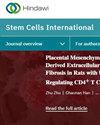HMGB1 Modulates High Glucose-Induced Erroneous Differentiation of Tendon Stem/Progenitor Cells through RAGE/β-Catenin Pathway
IF 3.3
3区 医学
Q2 CELL & TISSUE ENGINEERING
引用次数: 0
Abstract
The association of tendinopathy with diabetes has been well recognized. Tendon stem/progenitor cells (TSPCs) play critical roles in tendon repair, regeneration, and homeostasis maintenance. Diabetic TSPCs exhibit enhanced erroneous differentiation and are involved in the pathogenesis of diabetic tendinopathy, whereas the underlying mechanism of the erroneous differentiation of TSPCs remains unclear. Here, we showed that high glucose treatment promoted the erroneous differentiation of TSPCs with increased osteogenic differentiation capacity and decreased tenogenic differentiation ability, and stimulated the expression and further secretion of HMGB1 in TSPCs and. Functionally, exogenous HMGB1 significantly enhanced the erroneous differentiation of TSPCs, while HMGB1 knockdown mitigated high glucose-promoted erroneous differentiation of TSPCs. Mechanistically, the RAGE/β-catenin signaling was activated in TSPCs under high glucose, and HMGB1 knockdown inhibited the activity of RAGE/β-catenin signaling. Inhibition of RAGE/β-catenin signaling could ameliorate high glucose-induced erroneous differentiation of TSPCs. These results indicated that HMGB1 regulated high glucose-induced erroneous differentiation of TSPCs through the RAGE/β-catenin signaling pathway. Collectively, our findings suggest a novel essential mechanism of the erroneous differentiation of TSPCs, which might contribute to the pathogenesis of diabetic tendinopathy and provide a promising therapeutic target and approach for diabetic tendinopathy.HMGB1 通过 RAGE/β-Catenin 通路调节高血糖诱导的肌腱干/祖细胞错误分化
肌腱病与糖尿病的关系已得到广泛认可。肌腱干/祖细胞(TSPCs)在肌腱修复、再生和平衡维持中发挥着关键作用。糖尿病肌腱干/祖细胞表现出更强的错误分化,参与了糖尿病肌腱病的发病机制,而肌腱干/祖细胞错误分化的内在机制仍不清楚。在这里,我们发现高糖处理促进了 TSPCs 的错误分化,成骨分化能力增强,成腱分化能力下降,并刺激了 HMGB1 在 TSPCs 中的表达和进一步分泌。在功能上,外源性HMGB1能显著增强TSPCs的错误分化,而HMGB1敲除则能缓解高糖促进的TSPCs错误分化。从机制上讲,在高糖条件下,TSPCs的RAGE/β-catenin信号被激活,而敲除HMGB1抑制了RAGE/β-catenin信号的活性。抑制 RAGE/β-catenin 信号转导可改善高糖诱导的 TSPCs 错误分化。这些结果表明,HMGB1通过RAGE/β-catenin信号通路调控高糖诱导的TSPCs错误分化。总之,我们的研究结果表明了TSPCs错误分化的一个新的重要机制,它可能是糖尿病肌腱病变的发病机制之一,并为糖尿病肌腱病变提供了一个有前景的治疗靶点和方法。
本文章由计算机程序翻译,如有差异,请以英文原文为准。
求助全文
约1分钟内获得全文
求助全文
来源期刊

Stem Cells International
CELL & TISSUE ENGINEERING-
CiteScore
8.10
自引率
2.30%
发文量
188
审稿时长
18 weeks
期刊介绍:
Stem Cells International is a peer-reviewed, Open Access journal that publishes original research articles, review articles, and clinical studies in all areas of stem cell biology and applications. The journal will consider basic, translational, and clinical research, including animal models and clinical trials.
Topics covered include, but are not limited to: embryonic stem cells; induced pluripotent stem cells; tissue-specific stem cells; stem cell differentiation; genetics and epigenetics; cancer stem cells; stem cell technologies; ethical, legal, and social issues.
 求助内容:
求助内容: 应助结果提醒方式:
应助结果提醒方式:


